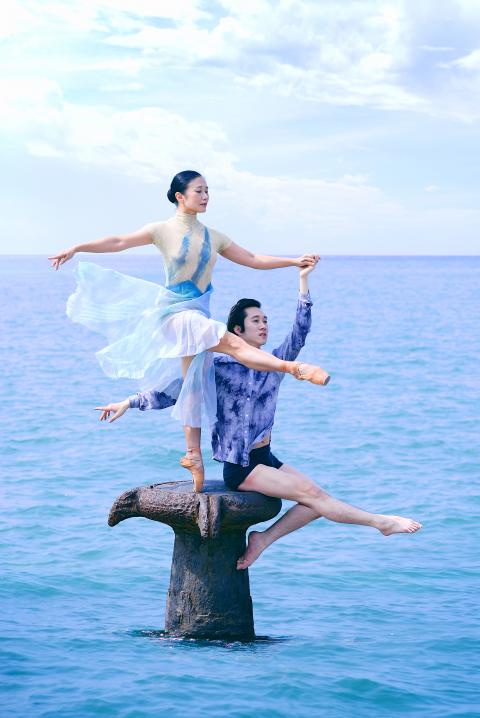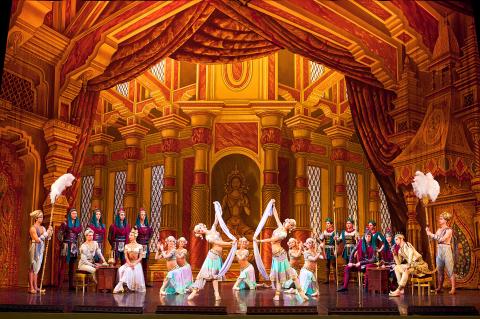Ballet fans can go for months in Taiwan without seeing a show, and then a deluge will hit and pointe shoes are popping up all over the place.
This weekend, coming hot on the heels of the Mariinsky Theatre Ballet Company’s performances at the National Theater in Taipei just two weeks ago, is one such time.
The 25-year-old St Petersburg Ballet Theatre and its tall prima ballerina, Irina Kolesnikova, have returned to Taiwan for a two-city tour that opens tonight at the National Theater with La Bayadere, but it is just one of several ballet productions in the north and south of the nation.

Photo courtesy of the Kaohsiung City Ballet
St Petersburg will give two performances of La Bayadere and three of Swan Lake, accompanied by the Evergreen Symphony Orchestra (長榮交響樂團), before moving on to Taichung next week, where the company will perform Swan Lake again, accompanied by the Taichung City Symphony Orchestra (台中市交響樂團).
Over at the Taipei City Government Family Theater, the Rondo Ballet Theater (羅德芭蕾舞團) will perform Coppelia on Saturday and Sunday, while at the New Taipei City Arts Center (新北市藝文中心演藝廳), the Taiwan Grand Prix International Ballet Competition opens this morning and runs through Sunday.
Last, but not least, the Kaohsiung City Ballet (KCB, 高雄城市芭蕾舞團) is moving up in the world, opening a three-city tour of its latest production, Water (水), at the National Kaohsiung Center for the Arts’ Playhouse on Saturday.

Photo courtesy of the St Petersburg Ballet Theatre
Getting back to La Bayadere, which has only been seen in Taiwan when the American Ballet Theater (ABT) visited Taipei in 2012, is a classic Russian production that was rarely performed in full outside of Russia until Natalia Makarova restaged a shortened version for ABT in 1980, although the Kingdom of the Shades scene, another “white ballet” utilizing most of a company’s corps de ballet, has been part of the repertoire of several companies around the world.
Originally choreographed by Marius Petipa to a score by Ludwig Minkus, La Bayadere, like the best of the Western classical ballet canon, is a tale of love, betrayal and redemption. Set in a royal court in ancient India, it tells the story of a temple dancer and a warrior, Nikiya and Solor, who are in love, but a high Brahmin priest is obsessed with Nikiya and plots to have Solar married to the rajah’s daughter, Gamzatti.
Coppelia is another 19th century romantic classic, albeit a happier one, originally choreographed by Arthur Saint-Leon to a score by Leo Delibes, although most productions now use a later version choreographed by Petipa. It tells the story of a mechanical doll that is so life-like that a young man falls in love with her, even though he is already engaged. Jealousy and confusion ensues.

Photo courtesy of the Leipzig Ballet
Rondo Ballet’s show might not have the scale of St Petersburg’s productions, but it does have a Germany-based Taiwanese ballerina, Taipei-born Vivian Wang (王苡), who joined the Leipzig Ballet last year. She will be partnered by another guest artist, Vincenzo Timpa, also from the Leipzig company.
KCB is going for a contemporary ballet with its new production, featuring works by frequent collaborators Constantin Georgescu, a Romanian choreographer/multimedia artist, and Kaohsiung-born Wang Kuo-chuan (王國權).
As with last year’s Light (光), KCB founder Chang Hsiu-ru (張秀如) asked the two men to create works based on a single theme.
Georgescu said his Water explores different states in which water can exist, and how these states can become metaphors for human connections and their interactions with the environment.
He conceived the piece like a photo album, where different moments can be viewed as connected or as separate parts.
Wang Kuo-chuan said his Water explores the quietness and the power of the liquid.
Performance notes:
WHAT: Irina Kolesnikova and St Petersburg Ballet Theatre
WHERE: National Theater (國家戲劇院), 21-1 Zhongshan S Rd, Taipei City (台北市中山南路21-1號)
WHEN: Tonight and tomorrow at 7:30pm — La Bayadere; Saturday at 2:30pm and 7:30pm, Sunday at 2:30pm — Swan Lake
ADMISSION: Remaining seats priced at NT$3,800 to NT$5,800, available online at tickets.udnfunlife.com and at convenience store. Tomorrow night is sold out.
ADDITIONAL PERFORMANCES: Swan Lake Friday and Saturday nights next week and Sunday afternoon at the National Taichung Theater (台中國家歌劇院) 101, Huilai Rd Sec 2, Taichung City (台中市惠來路二段101號). Tickets from NT$400 to NT$4,200, available as above
WHAT: Water
WHEN: Saturday at 7:30pm
WHERE: The Playhouse at the National Kaohsiung Center for the Arts (衛武營國家藝術文化中心) 1, Sanduo 1st Rd, Kaohsiung City (高雄市三多一路1號)
ADMISSION: Remaining tickets are NT$400 to NT$800, available at the center’s box offices, online at www.artsticket.com.tw and at convenience store ticket kiosks
ADDITIONAL PERFORMANCES: Aug. 24 at 7:30pm at the Pingtung County Art Center (屏東縣藝術館), 427, Heping Rd, Pingtung City (屏東市和平路427號), tickets NT$400 and NT$600; and Aug. 27 at the National Taichung Theater (台中國家歌劇院) 101, Huilai Rd Sec 2, Taichung City (台中市惠來路二段101號). Tickets from NT$400 to NT$1,200, available online at www.artsticket.com.tw and at convenience store ticket kiosks
What: Coppelia
When: Saturday at 7:30pm and Sunday at 2:30pm
Where: Taipei City Government Family Theater (台北市政府親子劇場), 2F, Taipei City Hall, 1 Shifu Rd, Taipei City (台北市市府路1號2樓)
Admission:NT$300 to NT$1,000; available at NTCH box offices and other ticketing outlets, online at www.artsticket.com.tw and at convenience store ticketing kiosks.

That US assistance was a model for Taiwan’s spectacular development success was early recognized by policymakers and analysts. In a report to the US Congress for the fiscal year 1962, former President John F. Kennedy noted Taiwan’s “rapid economic growth,” was “producing a substantial net gain in living.” Kennedy had a stake in Taiwan’s achievements and the US’ official development assistance (ODA) in general: In September 1961, his entreaty to make the 1960s a “decade of development,” and an accompanying proposal for dedicated legislation to this end, had been formalized by congressional passage of the Foreign Assistance Act. Two

Despite the intense sunshine, we were hardly breaking a sweat as we cruised along the flat, dedicated bike lane, well protected from the heat by a canopy of trees. The electric assist on the bikes likely made a difference, too. Far removed from the bustle and noise of the Taichung traffic, we admired the serene rural scenery, making our way over rivers, alongside rice paddies and through pear orchards. Our route for the day covered two bike paths that connect in Fengyuan District (豐原) and are best done together. The Hou-Feng Bike Path (后豐鐵馬道) runs southward from Houli District (后里) while the

March 31 to April 6 On May 13, 1950, National Taiwan University Hospital otolaryngologist Su You-peng (蘇友鵬) was summoned to the director’s office. He thought someone had complained about him practicing the violin at night, but when he entered the room, he knew something was terribly wrong. He saw several burly men who appeared to be government secret agents, and three other resident doctors: internist Hsu Chiang (許強), dermatologist Hu Pao-chen (胡寶珍) and ophthalmologist Hu Hsin-lin (胡鑫麟). They were handcuffed, herded onto two jeeps and taken to the Secrecy Bureau (保密局) for questioning. Su was still in his doctor’s robes at

Mirror mirror on the wall, what’s the fairest Disney live-action remake of them all? Wait, mirror. Hold on a second. Maybe choosing from the likes of Alice in Wonderland (2010), Mulan (2020) and The Lion King (2019) isn’t such a good idea. Mirror, on second thought, what’s on Netflix? Even the most devoted fans would have to acknowledge that these have not been the most illustrious illustrations of Disney magic. At their best (Pete’s Dragon? Cinderella?) they breathe life into old classics that could use a little updating. At their worst, well, blue Will Smith. Given the rapacious rate of remakes in modern